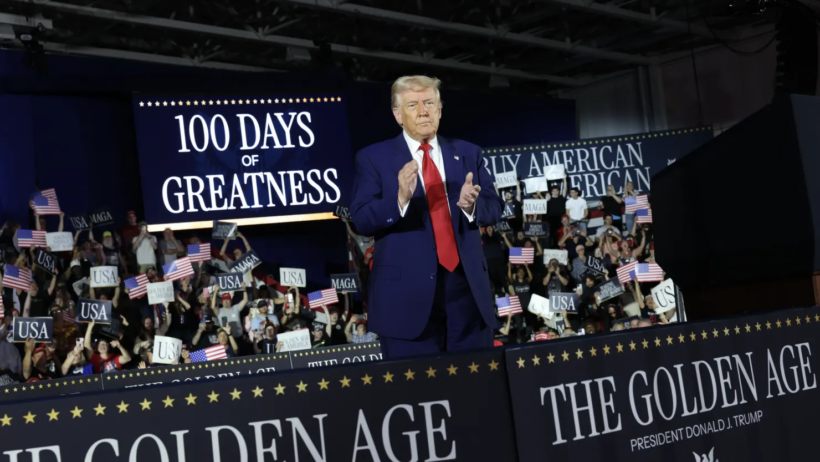
Scott Olson | Getty Images News | Getty Images
After U.S. President Donald Trump shattered — or at least fractured — global trade relationships and supply chains, there are promising signs of reconstruction in recent days. Indeed, U.S. Treasury Secretary Scott Bessent told CNBC on Monday the country is “very close to some deals.”
On Tuesday, newly elected Canadian Prime Minister Mark Carney met Trump at the White House, potentially resetting a bilateral relationship that has been strained since January. And Chinese Vice Premier He Lifeng is scheduled to meet Bessent in Switzerland this week for trade talks.
But enter the hurricane that is Trump, again. “We don’t have to sign deals, they have to sign deals with us. They want a piece of our market. We don’t want a piece of their market,” Trump said during his meeting with Carney, contradicting top White House officials’ claim for weeks that such deals are the administration’s top priority. Markets fell after his comments.
The growing protectionism of the U.S., ironically may help other countries forge closer economic ties with each other. The U.K. and India agreed on a bilateral trade agreement that will remove tariffs on most items within a decade. Meanwhile, ASEAN and China are set to meet on May 19 to negotiate improvements to a free-trade agreement, according to Malaysian Prime Minister Anwar Ibrahim on Monday.
They may be new bridges being built in the aftermath of Trump tariffs. But those connections could bypass the U.S. — which, according to Trump, does not need deals anyway.
What you need to know today
Officials from U.S. and China to meet
U.S. Treasury Secretary Scott Bessent and trade representative Jamieson Greer will meet with their Chinese counterparts in Switzerland this week to discuss economic and trade matters, their offices announced Tuesday. Later in the day, the Chinese Foreign Ministry said that Vice Premier He Lifeng, Beijing’s top official for China-U.S. economic and trade matters, will meet with Bessent in Switzerland, NBC News reported.
The UK and India reach a trade agreement
The United Kingdom and India struck a bilateral trade agreement Tuesday, under which a majority of goods traded between India and the U.K. will become “fully tariff-free within a decade,” according to the British government. India will begin slashing tariffs on key U.K. exports such as whisky and automotives, while the U.K. will remove all tariffs on 99.1% of imports once the agreement comes into force, the Indian government said.
Markets fall on Trump’s trade comments
U.S. stocks fell Tuesday after Trump gave belligerent comments on trade deals. The S&P 500 declined 0.77%, the Dow Jones Industrial Average lost 0.95% and the Nasdaq Composite retreated 0.87%. Europe’s regional Stoxx 600 index dropped 0.18%, ending its 10-day winning streak. Shares of Deliveroo rose 1.9% after the British food delivery company said it had agreed to a takeover offer from American rival DoorDash that values the company at £2.9 billion ($3.9 billion).
AMD beats earnings estimates, warns of chip controls
Advanced Micro Devices on Tuesday reported earnings for its first fiscal quarter that topped expectations and gave strong guidance for the current quarter. The forecast includes $800 billion in costs because of U.S. export limits on artificial intelligence chips. On a related note, Nvidia CEO Jensen Huang said Tuesday that China’s artificial intelligence market will likely reach about $50 billion in the next two to three years, and that missing out on it would be a “tremendous loss.”
India says it carried out strikes on Pakistan
India early Wednesday said its armed forces had conducted strikes against Pakistan and what it calls Pakistan-occupied Jammu and Kashmir, targeting “terrorist infrastructure.” The operation follows a militant attack in Pahalgam, Jammu and Kashmir, in which 26 people were killed last month and targeted nine sites, the statement said.
U.S. “not a good place to hide”: JPMorgan
U.S. exceptionalism — in which the American economy and financial market have outperformed those of other countries since the pandemic — might be a thing of the past. This time, the U.S. “is not a good place to hide” if global economic growth slows down, wrote JPMorgan strategist Mislav Matejka in a note on Tuesday.
And finally…

Feature China | Future Publishing | Getty Images
Trump trade tariffs slump widens to ‘nearly all U.S. exports,’ supply chain data shows
What began as a rapid drop in U.S. imports as shippers cut orders from manufacturing partners around the world has now extended into a nationwide export slump, with the U.S. agricultural sector and top farm products including soybeans, corn and beef taking the hardest hit.
The latest trade data shows that a slide in U.S. exports to the world, and China in particular, that began in January now extends to most U.S. ports. The Port of Portland, Oregon, tops the list with a 51% decrease in exports, while the Port of Tacoma, Washington, a large agricultural export port, has seen a 28% decrease.
The data is from trade tracker Vizion, which analyzed U.S. export container bookings for the five-week period before U.S. President Donald Trump’s tariffs began and the five weeks after the tariffs took effect.

